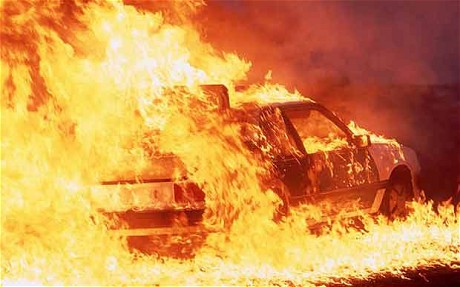
Cars can catch fire for many reasons. While mechanical or electrical issues are the most common cause cars can also catch fire as the result of a bad crash. If you see smoke or flames or smell burning rubber or plastic, you must respond IMMEDIATELY. An ounce of prevention is worth a pound of cure, so below are things you can do to help prevent fires from occurring in your car.
- Have your car serviced regularly by a professionally trained mechanic. If you spot leaks or your car is not running properly, get it checked immediately. A well-maintained car is less likely to have a fire.
- If you must transport gasoline in cans, transport only a small amount in a certified gas can that is sealed. Keep a window open for ventilation.
- Gas cans and propane cylinders should never be transported in the passenger compartment. Secure these containers in the trunk or bed of the vehicle and transport them for the least time and distance required.
- Never park a car where flammables materials can come into contact with hot car components (such as the exhaust system).
- Be able to recognize ‘red flags’ that can contribute to car fires such as cracked/loose wiring, fuses that blow despite replacement, loose/leaking hoses, and rapid changes in fluid/engine temperature and pressures.
- Always drive safely to help avoid accidents.
If you suspect that your car is catching fire:
- IMMEDIATELY pull over when safe to do so.
- Once the car is stopped: place the car in park, set the emergency brake and turn off the engine.
- Evacuate yourself and everyone in the car as quickly and safely as possible. Move away from the car and the road.
- Once outside and away from the car: GET OUT AND STAY OUT. Do not return to the car FOR ANY REASON.
- Call 9-1-1 and await emergency assistance.
And as always, “LIKE” us on FACEBOOK